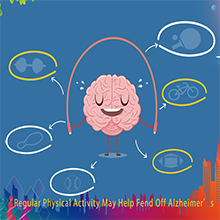26 September 2022

Shanghai, China – Regular physical activity more than 2 times a week has a positive effect on AD by modulating the effect of preclinical amyloid – in 918 northern Han participants without dementia, according to the CABLE study by researchers at Fudan University and Qingdao University.
The study was published online (pre-press) in the Journal of Alzheimer’s Disease on September 13, 2022.
Researcher investigated participants' physical activity habits and assessed their overall cognitive function and cerebrospinal fluid (CSF) biomarkers. A core finding was that regular physical activity was positively associated with CSF Aβ42 levels and cognitive function. And individuals over the age of 65 benefited more from this modifiable lifestyle factor. More impressively, mediation effects demonstrated that physical activity may improve cognition by improving AD pathological deposition.
"This is the largest study to systematically explore the relationship between physical activity, cognitive impairment, and CSF core AD biomarkers in non-demented adults," said Professor Jin-Tai Yu, who is from the Fudan University, Director of Memory Disorders Division at the Department of Neurology, Huashan Hospital.
Physical Activity for Prevention of Alzheimer’s Disease Looks Promising
“So far, the use of pharmacological interventions to treat AD has limited success,” said Professor Lan Tan, who is from the Qingdao University, Qingdao Municipal Hospital. “Safe, affordable interventions are urgently needed to protect older adults from cognitive decline."
The pathological features of AD are nerve fiber tangles, neuroinflammation, and Aβ plaques. Applying CSF biomarkers and their ratios improves the accuracy of AD diagnosis and treatment.
“More importantly, few studies investigated the AD pathology mechanisms underlying the relationship of physical activity and cognitive impairment,” said Professor Lan Tan. “But our team has designed and studied it in a large population, and indeed, as expected, the link to the CSF core AD biomarkers further confirms the beneficial effect of regular exercise on reducing AD risk.”
“In the future, lifestyle interventions such as physical activity are promising for dementia prevention,” said Professor Jin-Tai Yu. “Encouragingly, older adults benefit more from physical activity, providing an optimistic outlook for vulnerable populations.”
About the CABLE Study
The CABLE study is a large-scale cohort study in the Chinese Han population, focusing on CSF biomarkers and AD-risk factors. CABLE aims to explore the genetic and environmental factors that influence AD pathogenesis and provide specific guidelines for AD prevention and therapy.
Each participant received clinical and cognitive assessments, biochemical tests, and collection of blood and CSF samples. Demographic information, the profile of AD risk factors and medical history were obtained from a self-reported questionnaire and an electronic patient record system. The diagnoses of each participant were strictly aligned with the National Institute on Aging-Alzheimer’s Association (NIA-AA) workgroup diagnostic criteria.
Get your brain moving
Numerous studies have shown that physical activity can not only improve overall health, but also help prevent or delay the development of dementia.
The study demonstrated that physical activity could effectively regulate the level of CSF Aβ42. One explanation is that physical activity promotes anatomical, neurochemical, and electrophysiological changes in neurons by modulating multiple gene products at the mRNA and protein levels, ultimately activating multiple pathways to directly or indirectly regulate amyloid levels.
Well-characterized studies have suggested that physical activity can decrease or retard neurodegeneration by reducing the risk of cardiovascular disease, stroke, type 2 diabetes, and other conditions such as cancer. Moreover, physical activity can promote the release of hormones beneficial to neural development and improve neurocognition through increased metabolism, oxygenation, and blood flow.
It is worth mentioning that although previous studies have mentioned the relationship between physical activity and AD risk. However, in this study, the relationship between AD risk and physical activity was not quantified, but rather focused on the number of physical activity days per week. “The next step for the team is to focus on performing a dose-response analysis by physical activity type, intensity, duration or otherwise to develop more detailed exercise guideline recommendations,” said Professor Jin-Tai Yu.
Notes for editors
Full study: "Associations of Physical Activity with Alzheimer’s Disease Pathologies and Cognition: The CABLE Study" by Sh Zhong, B Zhao, YH Ma, Y Sun, YL Zhao, WH Liu, YN Ou, Q Dong, L Tan, JT Yu; (DOI: 10.3233/JAD-220389) published in Journal of Alzheimer's Disease, Volume (89) Issue (2) by IOS Press. The article is online at: https://content.iospress.com/articles/journal-of-alzheimers-disease/jad2....
Contact
Jin-Tai Yu, MD, PhD
Fudan University, Huashan Hospital, Shanghai, China
Email: jintai_yu@fudan.edu.cn or yu-jintai@163.com
Tel: +86 21 52888160
Lan Tan, MD, PhD
Qingdao University, Qingdao Municipal Hospital, Qingdao, China
Email: dr.tanlan@163.com
Tel: +86 21 62483421
About the Journal of Alzheimer’s Disease
Now in its 25th year of publication, the Journal of Alzheimer’s Disease (JAD) is an international multidisciplinary journal to facilitate progress in understanding the etiology, pathogenesis, epidemiology, genetics, behavior, treatment, and psychology of Alzheimer’s disease. The journal publishes research reports, reviews, short communications, book reviews, and letters-to-the-editor. Groundbreaking research that has appeared in the journal includes novel therapeutic targets, mechanisms of disease, and clinical trial outcomes. JAD has a Journal Impact Factor of 4.160 according to Journal Citation Reports (Clarivate, 2022). The journal is published by IOS Press. j-alz.com
About IOS Press
IOS Press is an independent international scientific, technical, medical (STM) publishing house established in 1987 in Amsterdam. We produce around 90 journals and 70 books annually in a broad range of subject categories, primarily specializing in biomedical and life sciences (including neurosciences, medical informatics, cancer research, rehabilitation) and physical sciences (including computer sciences, artificial intelligence, engineering). In addition, we offer specialized services that support scientific advancement. iospress.com.







